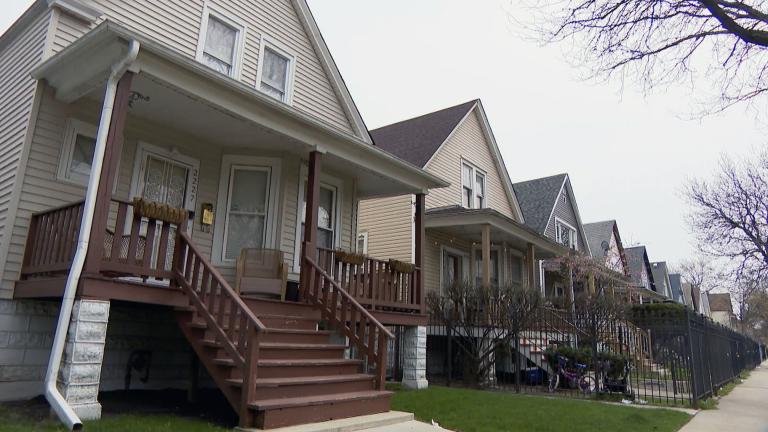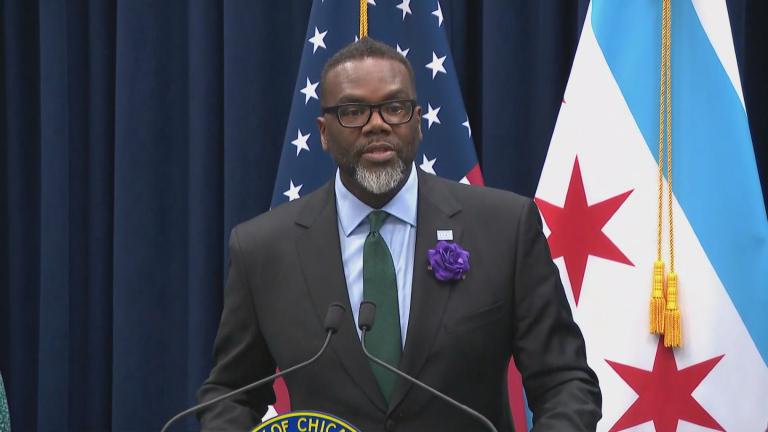Mayor Brandon Johnson put forward a $16.6 billion spending plan for 2024 on Wednesday that eliminates a $538 million shortfall and prioritizes new investments in affordable housing, mental health services and environmental justice.
Johnson’s first spending plan does not include a property tax hike to keep up with the rising rate of inflation, or new taxes or fee hikes to cover the city’s budget deficit, which has been swollen by the arrival cost of caring for migrants sent to Chicago from the southern border and soaring pension payments, according to the proposal released by the Johnson administration.
“I was elected to end this government’s addiction to the regressive taxation that has pushed working families to the brink,” Johnson said. “That begins today.”
Johnson’s budget proposes no layoffs or service cuts to staunch the flow of red ink he confronted after taking office in May, amid the spiraling humanitarian crisis posed by the arrival of migrants from the southern border, but relies on efficiencies and better than expected revenue projections.
In advance of his speech, Johnson worked for weeks to tamp down the sky-high expectations of the progressive political organizations that fueled his come-from-behind victory, a down payment on promises to invest in working-class Chicagoans. On Wednesday, Johnson said he had done just that.
“We will ensure that every resident of this city can thrive in peace and prosperity, connected to all the amenities and resources they need to confidently say what we all know to be true, ‘This is the greatest freaking city in the world,’” Johnson said, earning his first round of applause.
Johnson’s spending plan calls for the city to double the number of social workers, addiction specialists and counselors working to respond to 911 calls for help from people experiencing mental health crises and to open two new mental health clinics in facilities already operated by the Chicago Department of Public Health.
That alternate-response program, launched by former Mayor Lori Lightfoot as a pilot program is now a permanent part of the city’s approach to those in crisis, Johnson said.
Those proposals are the core of the plan known as “Treatment Not Trauma,” which Johnson pledged to implement if elected mayor. In all, Johnson proposed spending $4.8 million more next year on mental health services in his budget.
Johnson will also propose expanding the city’s youth jobs program by 4,000 positions to 28,000 jobs, according to the proposal. More than 46,000 teens and young adults applied for the city’s summer jobs program in 2023, according to city records.
In addition, Johnson will ask the City Council for an addition $10 million that expands the city’s program that offers grants to low-income homeowners to make needed repairs.
The spending plan calls for an additional $6.8 million for the city’s shelter system, which has been strained to the breaking point with the arrival of more than 18,000 migrants in Chicago, all of whom entered the country legally after requesting asylum.
“Chicago is a place strong enough to welcome and embrace newcomers while honoring our commitments to those who are already here, especially those who have long suffered disinvestment,” Johnson said.
But despite that resilience, Johnson pleaded for more help.
“As the city confronts this moment, we continue to call upon the state of Illinois and the federal government to provide greater coordination, collaboration and resources dedicated to this issue,” Johnson said.
The mayor’s spending plan also sets aside an additional $900,000 to reestablish the Department of the Environment as part of a renewed emphasis on environmental justice that would fulfill a key campaign promise made by Johnson.
Former Mayor Rahm Emanuel disbanded the department in 2012, and Lightfoot did not make good on promises to bring it back.
Johnson also proposed reversing Lightfoot’s 2019 decision to combine the departments of Innovation and Technology and Fleet and Facility Management. Johnson seeks to reinstitute the department known as 2FM and create a separate department of Technology and Innovation, according to the proposal.
New Approach to Public Safety
The spending plan unveiled by Johnson represents his first attempt to transform the Chicago Police Department into an agency better prepared to implement the more “holistic” approach to public safety that focuses on the “root causes” of crime, as the mayor promised during the campaign.
Johnson’s plan would make 398 of the department’s more than 11,700 sworn positions into jobs open to civilians, who would not have law enforcement powers, while creating “440 promotional opportunities.”
CPD would also add training officers, and see its fleet of vehicles expand to accommodate the nearly 200 new detectives Johnson has promised to promote.
The overall budget for the Police Department would rise from $1.94 billion in 2023 to $1.99 billion under Johnson's proposed budget.
That means Johnson did not seek to eliminate any of the more than 1,700 vacant positions in the Chicago Police Department.
How the Budget Got Balanced
Johnson balanced the city’s 2024 budget by cutting $243.3 million, and finding an additional $321.3 million in new revenue, according to the plan.
Johnson plans to use $49.5 million from the city’s Tax Increment Financing program to help fill the budget shortfall. Budget Director Annette Guzman told reporters that the surplus is the largest in 15 years and is $39 million more than the surplus declared in 2023.
The city’s financial picture is not only being buoyed by that burst of additional TIF revenue, but also by $50 million from the city’s surplus from prior years. Chicago ended 2022 with a surplus of $307.3 million, according to the city’s annual financial report.
In addition, Chicago has $461.5 million left unspent from the nearly $2 billion in federal relief funds the city got in 2021 to strengthen Chicago’s tattered social safety net and provide direct aid to Chicagoans struggling to recover from the COVID-19 pandemic, officials said.
The city’s finances will continue to be pinched by soaring pension payments, as the city complies with a state law that requires two of Chicago’s funds be funded at a 90% level by 2055 and the other two by 2058, ensuring they can pay benefits to employees as they retire.
In 2024, state law requires Chicago to pay more than $2.41 billion to its pension funds. Johnson also proposed making an additional payment to the city’s four pension funds of $306.6 million, following a policy put in place by Lightfoot, to prevent “further growth of the city’s unfunded pension liabilities,” according to the forecast released by the Johnson administration.
Johnson will ask the City Council to give his budget final approval on Nov. 15, after nearly a month of hearings and negotiations.
Contact Heather Cherone: @HeatherCherone | (773) 569-1863 | [email protected]






